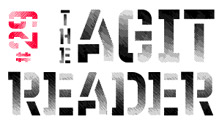
It Girl
by Ron Wadlinger
Over the past two years, Marnie Stern has made the proverbial leap from bedroom-guitarist obscurity to national recognition as one of today’s more interesting and inventive musicians and songwriters. Stern’s sophomore album, This Is It and I Am It and You Are It and So Is That and He Is It and She Is It and It Is It and That Is That (Kill Rock Stars), showcased the further development of her layered, hammer-on-heavy guitar style in the context of fresh, well-crafted songs.
Stern’s appeal may arise primarily from her seemingly effortless ability to bridge what was once believed to be two diametrically opposed factions: the guitar heroes and the indie hipsters. Stern’s guitar pyrotechnics aren’t bombast for bombast’s sake, much in the same way that her Lightning Bolt and Don Caballero-influenced songs aren’t complex and aggressive just to challenge listeners. Instead, Stern uses layer upon layer of lead guitars to form a rhythmic foundation upon which her dynamic compositions are able to search out new sonic ground. It’s not an overstatement to say that Stern is one of the more exciting musical talents in contemporary rock music.
Stern, supported by former U.S. Maple guitarist Mark Shippy and former Parts & Labor drummer Jim Sykes, recently toured in support of This Is It . . ., and the affable New Yorker sat down with me in Columbus to talk about how she has developed this distinctive musical voice and style.
As cliché as it sounds, your songs do have a unique sound to them. You sort of utilize lead guitar riffs as the foundation of the song. Were you aiming for something in particular as you developed your songwriting style?
Marnie Stern: No, I was just trying to find my way, so I kept trying to do a lot of different things. For a long time, I didn’t have Pro Tools, so I couldn’t lay down lots of guitar parts. Then I got Pro Tools, and the more I worked on it, I just started layering and layering it. It just sort of developed from there.
So there was no intention to go against rhythm guitars or anything like that?
MS: Well, bands like Hella and Lightning Bolt were just two pieces where it was essentially the same thing—where there was just one lead guitar part, there just wasn’t singing—so I wanted to try and do something like that but also put singing over it and try to turn it into a more conventional type song.
Do you have a particular songwriting process?
MS: It’s just slow. I wake up every day, I do a part—one guitar part that’s like 10 seconds long,—and then I try to find another part to go over it. Then I try to put vocals over that, then go to the next part. Usually every day or two, I come up with a song. Usually I hate it, so I have so many songs that I throw away. Once every couple months, out of working every day, there’s one song that I’m like, “Okay, that’s okay.” It’s a long process. Every day, trial and error, really.
I know when you first started playing out you were doing iPod-accompanied shows. Have you found that consistently playing, touring, and recording with a full band has helped you to develop your sound in any certain way?
MS: No, but I enjoy it much more. It’s really hard touring with the iPod. I just did it because at that point, I had just released the first record, Zach [Hill] was touring with Hella, and I didn’t have any music friends. I couldn’t find anyone to go with me, so I just said, “Okay, well I’ll have to go with the iPod.” I didn’t know it would be such a big deal and it would be considered such a lame thing. I understand it now kind of, but at the time I just didn’t think I had any other choice.
And so that’s why I did that, but I much prefer touring with people. If I’m stuck in a rut and I have a show in New York last minute, then I’ll do an iPod, but usually no.
How active of a role did you take in the record‘s production?
MS: I definitely wanted it to be layered—that’s my thing, especially with vocals and guitars. The way it works is I record at home with the Pro Tools, then I send it to Zach. He puts drums over it, then I go out there to California and we do overdubs with guitars and vocals. Usually we leave a lot of the stuff that I’ve already done. The stuff I do at home is the foundation, so on one hand I’d say I have a lot to do with production because the demo ends up being the song.
But Zach has a really good ear and lends a lot in terms of production, especially in terms of arrangement. The first record, especially, there were lots of parts where he wanted to repeat verses and choruses because I have a short attention span. I always think people are going to get bored quickly, so I want it to be as short as possible. And he kind of would say, “No, we need to repeat this, we need to do that.”
You see Don Caballero referenced a lot as one of your formative influences.
MS: They were a big influence because of the counterpoint in all of their riffs and the way things balanced off of each other. I really like that, similar to the way in which Television has those guitar lines that really fit with each other in an interesting way. That’s the part I like doing the most when I’m trying to come up with songs—the one part and then the other part over it, the way it fits like a jigsaw puzzle.
What’s the story behind the cover of “Don’t Stop Believing”?
MS: Actually, I didn’t pick that. Someone who deals with licensing said, “Oh, do you want to try out for the Shrek 3 soundtrack? It’s a cover of ‘Don’t Stop Believing.’” And I said, “Yeah, of course.” So, I just did a cover for her. They didn’t pick me, but then I just had it sitting around. So I thought, “Okay, I’ll put it on my MySpace.”
I admit that one of my favorite things about the new record is that one of the songs makes a Back to the Future reference with the song title, “Roads? Where We’re Going We Don’t Need Any Roads.”
MS: I kind of ripped that off of Don Cab, the way they do very esoteric, strange song titles. Hella does that too, and I really like that. And then I like action movies a lot, and that was one of my favorite movies. So yeah, I love that.
What have you found most surprising since the time when Kill Rock Stars first agreed to release your records?
MS: Oh, just that people that used to give me the cold shoulder are much nicer now, which I feel is very annoying. I feel like good music is good music, and it’s a shame that you have to be on a record label for people to accept you. I was playing shows with the same music for a long time, and nobody really cared, and now they do. So I’m happy about that, but at the same time I feel strange about it because, I don’t know, it’s a weird thing, the way validation works.
Did you ever consider self-releasing any records?
MS: I didn’t know how. I don’t have many friends, I’m not a networker; I don’t know the right people socially. And that’s how so many people get record deals. So I just didn’t even know what to do. I thought about it all the time. I would talk about it with my best friend, like, “What do I do, what can I do?” Especially in New York where everyone’s doing music, I just felt I was going to continue doing what I was doing forever, and I would be fine with it.
What’s next for you?
MS: I like touring. It’s the only time when I’m not working on music, ever, so when I’m on the road I try to come up with ideas and directions for the next thing. Sometimes when I get home... I noticed with the last record, I had all these ideas and when I sat down, executing them was totally different than having the ideas. So I’m going to try to execute them. If it works, it works. If not, I’ll just be working until I come up with the next batch of songs and then I’ll record them at some point.
